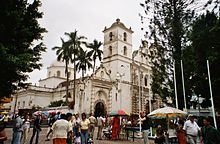Honduras: OAS plan to combat corruption
Despite the growing political volatility in Honduras, President Juan Orlando Hernandez has managed to remain in office by negotiating with the Organization of Americans States (OAS) to adopt a plan to facilitate national dialogue.
The following article, published in the November-December 2015 NewsNotes, was written by Sustainable Pathways to Peace and Security intern Nicholas Alexandrou.
On September 3, after a rising anti-corruption citizens’ movement and protests of what became known as the “La Linea” (“the Line”), Guatemalan President Oscar Perez Molina resigned.
In neighboring Honduras, however, President Juan Orlando Hernandez has yet to meet the same fate despite a series of scandals involving the embezzlement of US$200 million from the Social Security Institute and illicit financing of his presidential campaign (See July-August 2015 NewsNotes, “Central America: Corruption fuels protests”).
Despite the growing political volatility produced by these corruption scandals, flanked by an outraged middle-class movement known as the “movimiento indignado” and a somewhat half-hearted unified political opposition, the Honduran president has managed to remain in office by negotiating with the Organization of Americans States (OAS).
The process of bringing opposition figures from the “movimiento indignado” and other civil society groups to the negotiating table with OAS representatives has proved to be difficult. Talks between the Honduran president and recently-elected Secretary General of the OAS, Luis Almagro, resulted in a plan to facilitate national dialogue. The secretary general appointed Chilean diplomat and OAS employee John Biehl as the chief negotiator for President Hernandez.
Within a week, Biehl raised eyebrows by claiming that President Hernandez was the so-called “victim” of a government lacking credibility. Biehl said he has “no reason to doubt” the honesty of the Honduran president as he “has spoken very frankly.”
After meeting with approximately 100 civil society organizations composed of academics, workers, businesses, “indignados,” human rights, and farmworkers, the Honduran government and the OAS composed a plan that many criticized as lacking essential anti-corruption elements. The final plan agreed upon by the Honduran government and the OAS on September 28 was far less significant than the work of Guatemala’s independent UN-sponsored court, the International Commission Against Impunity in Guatemala (CICIG).
Known as the “Mission Against Corruption and Impunity in Honduras” (MACCIH), the Honduran plan contains a set of interlocking components that define the general objective of engaging with Honduran institutions. Many of these components will play an advisory role through monitoring, evaluating, and information sharing. The Wilson Center has a well-detailed critical overview of the MACCIH’s mechanism.
Many of the civil society organizations consulted by the Honduran government and the OAS during the national dialogue criticize the plan’s limited advisory role, judging it to be nothing more than window dressing. While international judges and lawyers are expected to supervise and assist Honduran institutions, the perceived deep-seated culture of corruption in these institutions make many citizens skeptical of the fruitfulness of these efforts. The MACCIH should by no means be compared to the CICIG. While the CICIG maintained an independent judicial court, something many Hondurans want, the MACCIH has no such feature.
For President Juan Orlando Hernandez, the MACCIH represents an opportunity to offer a weak response to pressure to address institutional corruption in Honduras. For the OAS secretary general, the mission is a gamble in demonstrating the relevance of the OAS as a promoter of democratic institutions. Unfortunately, the general lack of investigative or legally binding measures rules out the possibility of genuine enforcement measures against impunity and corruption.

